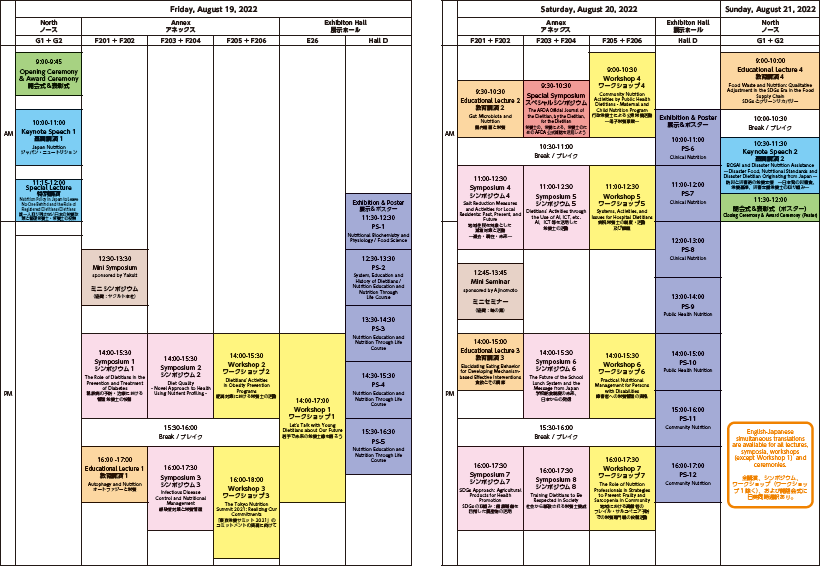PROGRAM
Please click the images to enlarge and view.
Program & Abstract
Program (as of August 10, 2022) can be downloaded here.
Abstract (as of August 10, 2022) can be downloaded here.
Friday, August 19, 2022
| 9:00-9:45 | Opening Ceremony & Award Ceremony | |
|---|---|---|
| 10:00-11:00 | Keynote Speech 1 | Japan Nutrition
|
| 11:15-12:00 | Special Lecture | Nutrition Policy in Japan to Leave No One Behind and the Role of Dietitians
|
| 14:00-15:30 | Symposium 1 | The Role of Dietitians in the Prevention and Treatment of Diabetes
|
| 14:00-15:30 | Symposium 2 | Diet Quality - Novel Approach to Health Using Nutrient Profiling –
|
| 14:00-17:00 | Workshop 1 | Let's Talk with Young Dietitians about Our Future
|
| 14:00-15:30 | Workshop 2 | Dietitians' Activities in Obesity Prevention Programs
|
| 16:00-17:00 | Educational Lecture 1 | Autophagy and Nutrition
|
| 16:00-17:30 | Symposium 3 | Infectious Disease Control and Nutritional Management
|
| 16:00-18:00 | Workshop 3 | The Tokyo Nutrition Summit 2021: Realizing Our Commitments
|
Saturday, August 20, 2022
| 9:00-10:30 | Workshop 4 | Community Nutrition Activities by Public Health Dietitians - Maternal and Child Nutrition Program
|
|---|---|---|
| 9:30-10:30 | Educational Lecture 2 | Gut Bacteria and Nutrition (tentative)
|
| 9:30-10:30 | Special Symposium | The AFDA Official Journal of the Dietitian, by the Dietitian, for the Dietitian
|
| 11:00-12:30 | Symposium 4 | Salt Reduction Measures and Activities for Local Residents: Past, Present, and Future
|
| 11:00-12:30 | Symposium 5 | Dietitians' Activities through the Use of AI, ICT, etc.
|
| 11:00-12:30 | Workshop 5 | Systems, Activities, and Issues for Hospital Dietitians
|
| 14:00-15:00 | Educational Lecture 3 | Appetite and Its Regulation
|
| 14:00-15:30 | Symposium 6 | The Future of the School Lunch System and the Message from Japan
|
| 14:00-15:30 | Workshop 6 | Practical Nutritional Management for Persons with Disabilities
|
| 16:00-17:30 | Symposium 7 | SDGs Approach: Agricultural Products for Health Promotion
|
| 16:00-17:30 | Symposium 8 | Training Dietitians to Be Respected in Society
|
| 16:00-17:30 | Workshop 7 | The Role of Nutrition Professionals in Strategies to Prevent Frailty and Sarcopenia in Community
|
Sunday, August 21, 2022
| 9:00-10:00 | Educational Lecture 4 | The SDGs and Green Recovery
|
|---|---|---|
| 10:30-11:30 | Keynote Speech 2 | BOSAI and Disaster Nutrition Assistance
|
| 11:30-12:00 | Closing Ceremony | |
Sponsored Program
Friday, August 19, 2022 12:30-13:30 @Room F201+F202 Mini Symposium sponsored by Yakult Honsha Co., Ltd.
MS-1 Efficacy of probiotics on digestive disorders and acute respiratory infections: A controlled clinical trial in young Vietnamese children

Truong Tuyet Mai National Institute of Nutrition, Vietnam
TRUONG TUYET MAI, MD, PhD, Asc. Professor, Vice- Director of the National Institute of Nutrition, Ministry of Health, Vietnam and Adjunct Professor for the School of Medicine Hai Phong, School of Medicine Hanoi, Vietnam. She is a Medical Doctor and a nutrition expert. She took Ph.D on Nutrition at Japan’s Women University, Tokyo, Japan, in 2008. She has a big experience in the implementation of various food and nutrition programmes/researches which included the publication nutrition document and press articles in national journal and international journal. Her research focusing on nutrition community for preventing the malnutrition, micronutrient deficiencies, overweight-obesity, non-communicable diseases, also food safety, food system and food security in Vietnam. She is member of editor board for the national journal in medicine in Vietnam. She is member of sterring committee of Vietnam Nutrition Association, Vietnam Food Safety Asscociation, Vietnam Preventive Medicine Association. She also plays the role as advisor for the making nutrition policy in Vietnam, developing and surveillance the National Nutrition Strategy, National Plan Action of Nutrition, National Action Plan of Food System, National Target programs. She is also Co-Chair of the Technique Working Group on Nutrition in Vietnam, also member of Secretary Board for National Nutrition Strategy in Vietnam.
Objectives: To evaluate the efficacy of fermented milk containing Lactobacillus casei strain Shirota* (LcS) on the incidence of constipation, diarrhea, acute respiratory infections (ARI), and nutritional status of young Vietnamese children.
Methods: A controlled field trial was conducted with 1,003 children (3-5 years old) in Thanh Hoa province in Vietnam. The probiotic group (n=510) consumed fermented milk 65 mL/day containing 108 CFU/mL of LcS for the 12-week intervention period, whereas the control group (n=493) was not given any. The incidence of constipation, diarrhea, ARI, and anthropometry in children was determined at baseline, after 4, 8, and 12-week intervention, and after the 4-week follow-up period.
Results: Probiotic drink decreased the incidence of constipation after the 12-week intervention period (12.0% vs 32.0%, OR = 0.28 (95%CI: 0.21-0.40), p<0.001), tended to decrease the incidence of diarrhea (4.9% vs. 7.9%, OR = 0.60 (95%CI: 0.35-1.01), p = 0.068), and prevented the occurrence of ARI (15.9% vs. 24.5%, OR = 0.58 (95%CI: 0.42-0.79), p<0.001), when compared with the control group. In contrast, no probiotic effects were observed for the duration of diarrhea or ARI. Weight gain was higher in the probiotic group than in the control group after 4, 8, and 12-week intervention and after the 4-week follow-up period (p<0.05).
Conclusion: Daily intake of fermented milk containing LcS strongly prevented the incidence of constipation and ARI in Vietnamese children. This study also revealed the potential effects of the use of a probiotic drink on diarrhea prevention as well as nutritional status improvement.
* Reclassified as Lacticaseibacillus paracasei strain Shirota in April 2020.
MS-2 Effect of Lacticaseibacillus paracasei strain Shirota supplementation on clinical responses, gut microbiota and faecal metabolites in patients with Parkinson’s disease: A randomized, double-blind, placebo-controlled trial

Xiaodong Yang Ruijin Hospital, Shanghai Jiao Tong University School of Medicine
Work Experience
2014-2017 Shanghai Jiao Tong University School of Medicine MD, PhD
2017-Present Department of Neurology at Ruijin Hospital, Shanghai Jiao Tong University School of Medicine.
Main Research
The role of gut microbiome in the pathogenesis, diagnosis and treatment of Parkinson's disease and related disorders. Published more than 20 SCI papers including Brain, Neurology, Movement disorders et al.
Qualifications and Awards
- Doctor-in-charge
- 2019: Shanghai Outstanding Residents Award
Association Membership
- Standing Committee Member of Precision Medicine Expert Committee of Shanghai Biomedical Industry Association.
- Member of the International of Parkinson and Movement Disorder Society
- Reviewers for various journals including 《Journal of Neurochemistry》《BMC Neurology》《Neuroscience Bulletin》《Frontiers in neuroscience》et al.
Academic Events
- 2020: International of Parkinson and Movement Disorder Society Travel Grant
Background: Growing evidence suggested that Parkinson’s disease (PD) is associated with gut microbiota dysbiosis. Microbial therapy may be a useful approach for the treatment of PD. However, comprehensive analyses of the impact of probiotic supplementation on motor and nonmotor symptoms are still lacking and the mechanisms remain unclear.
Methods: We performed a randomized, double-blind, placebo-controlled trial in PD patients with constipation to investigate Lacticaseibacillus paracasei strain Shirota* (LcS), supplementation on clinical responses, gut microbiota and faecal metabolites. Patients (n = 128) were randomised to receive either probiotics (LcS-fermented milk, containing 1×1010 living LcS cells) or placebo daily 100 mL for 12 weeks.
Results: We found that LcS intervention significantly alleviated patients’ constipation-related symptoms and nonmotor symptoms. There were also significant differences in the relative abundance of different taxa ranging from phylum to genus levels between the groups, especially regarding LcS intake, which increased the abundance of genus Lacticaseibacillus compared with those at baseline and in the placebo group. The faecal concentration of L-tyrosine was significantly decreased, and plasma concentration of L-tyrosine was increased in the probiotic group compared with the placebo group. Furthermore, we detected a negative correlation between the change in faecal and plasma concentrations of L-tyrosine in the probiotic group.
Conclusions: Our study demonstrated that supplementation with LcS may effective in managing constipation and other nonmotor symptoms for PD patients. The effects may be derived from mechanisms associated with a modulation of gut microbiota and faecal metabolomic profiles.
* Formerly Lactobacillus casei strain Shirota.
Saturday, August 20, 2022 12:45-13:45 @Room F201+F202 Mini Seminar sponsored by Ajinomoto Co., Inc.
What umami seasonings bring to the plate? The history of umami

Hitomi Hayabudhi, R.D., M.S. & Ph.D. Professor emeritus of Fukuoka Women's University and Grand Fellow of Fukuoka Asia Urban Research Center
1976-1979 Graduate School of Medical Sciences, Kyushu University, Ph.D.
1974-1975 Graduate Course, Ochanomizu University, M.S.
1970-1973 Fukuoka Women's University
2017-2021 Specially Appointed Professor, Nara Women's University
2000-2016 Professor, Graduate Corse, Fukuoka Women's University
1984-1999 Associate Professor, Fukuoka Women's University
1981-1983 Lecturer, Faculty of Education, Saga University
Directors of The Japanese Society of Shokuiku, The Japanese Association of Nutritional Science Education, and The Japanese Society on Nutrition Care & Management. Member of the Japanese Society of Hypertension Salt Reduction Committee.

Nattida Chotechuang (B.Sc., M.Sc., Ph D.) Assistant Professor, Department of Food Technology, Faculty of Science, Chulalongkorn University
Nattida Chotechuang studied Biochemistry (B.Sc. and M.Sc.) at Chulalongkorn University and Human Nutrition (Ph.D.) at AgroParisTech, France. During her Ph.D., she investigated the effect of high protein diet and amino acid signaling on protein metabolism in liver. Then, she gained experience at food industry working as researcher at Ajinomoto company (Japan). She started her academy career as lecturer at Department of Food Technology, Faculty of Science, Chulalongkorn University in 2010. She focused on her research on development of food products which promotes health and prevent diseases. Currently, she has the collaboration with colleagues at faculty of medicine, Chulalongkorn university, to develop the beverage from Thai plants to prevent kidney stone diseases, food for Parkinson patients project and also medical devices for screening smell loss symptoms.
The world’s population is aging along with the growing prevalence of chronic diseases such as cardiovascular diseases (CVDs), that are the leading cause of death around the globe, and neurological disorders such as Parkinson’s diseases (PD). Most CVDs, that are more frequent in low- and middle-income countries, can be prevented by increasing the consumption of fruits and vegetables and reducing the consumption of excess salt (1). Healthy diets not only have a lower impact in the environment but also a lower social burden making them more sustainable (2). The WHO recommends consuming less than 5 g of salt (2 g of sodium) per day, however the challenge of lowering the salt content is that foods lose palatability (3). Among PD patients, one of the earlier signs of the diseases is the loss of olfactory and taste function (dysgeusia), including umami (4). In this seminar, speakers will share evidence showing that the umami seasoning monosodium glutamate (MSG) can compensate the lack of palatability caused by lower salt as a solution to reduced salt intake (5). You will hear as well how dysgeusia can lead to poorer appetite and the need to add more seasonings to foods in PD patients (4). Participants will learn that the use of new low-Na high-K foods aimed at lowering blood pressure in free-living settings may be feasible and effective (6), and that they are being used to improve the food environment. Overall, in CVDs and in neurological disorders becomes important to season appropriately nutritious and healthy foods not only to curve down the intake of salt but also to prevent all forms of malnutrition.
- References:
-
- WHO. Healthy Diet 2020 [cited 2022 12 July]. Available from: https://www.who.int/news-room/fact-sheets/detail/healthy-diet.
- Clark M, Springmann M, Hill J, Tilman D. Multiple health and environmental impacts of foods. Proc Natl Acad Sci U S A. 2019;116(46):23357-62.
- WHO. WHO global sodium benchmarks for different food categories. Licence: CC BY-NC-SA 3.0 IGO. ed. Geneva: World Health Organization; 2021.
- Jagota P, Chotechuang N, Anan C, Kitjawijit T, Boonla C, Bhidayasiri R. Umami and Other Taste Perceptions in Patients With Parkinson’s Disease. J Mov Disord. 2022;15(2):115-23.
- Hayabuchi H, Morita R, Ohta M, Nanri A, Matsumoto H, Fujitani S, et al. Validation of preferred salt concentration in soup based on a randomized blinded experiment in multiple regions in Japan-influence of umami (L-glutamate) on saltiness and palatability of low-salt solutions. Hypertens Res. 2020;43(6):525-33.
- Umeki Y, Hayabuchi H, Adachi H, Ohta M. Feasibility of Low-Sodium, High-Potassium Processed Foods and Their Effect on Blood Pressure in Free-Living Japanese Men: A Randomized, Double-Blind Controlled Trial. Nutrients. 2021;13(10):3497.
![ACD2022 | The 8th Asian Congress of Dietetics 2022.8.19[FRI]-21[SUN] in PACIFICO Yokohama](images/sub_title.png)


